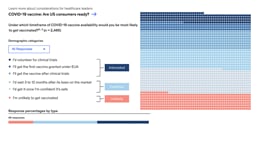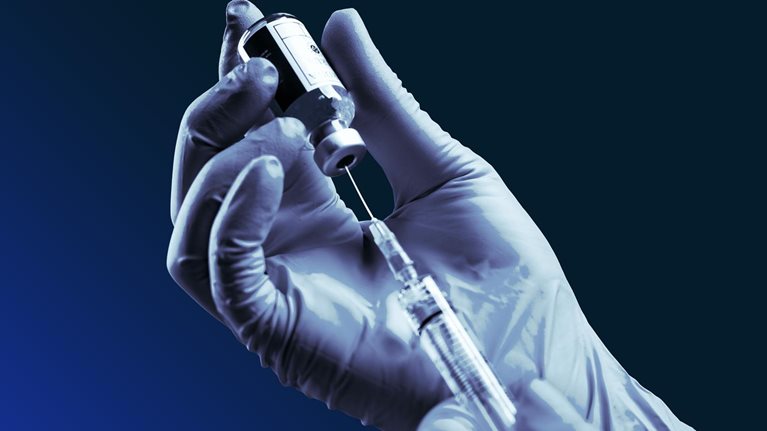Update: March 25, 2022
The number of vaccinated US respondents in McKinsey’s Consumer Health Insights survey has remained about the same since November of 2021, when 77 percent reported that they were vaccinated. Approximately 75 percent of respondents to the February survey reported that they’d been vaccinated; in addition, 63 percent of vaccinated respondents plan to stay current on COVID-19 vaccinations as recommended by healthcare leaders.
Home has become the location of choice for many respondents when it comes to several healthcare-related activities. Consumers are increasingly comfortable testing for COVID-19 at home, in fact, it now ranks at the most preferred testing location. Additionally, more than half of respondents indicated that they would prefer a health plan with virtual health benefits. The biggest drivers among those who value virtual care options are convenience and safety, however the tendency for this type of care to feel impersonal still weighs on the minds of many consumers.
Amid this “new normal,” many employees continue to seek new options for how and where they conduct work. In-person interactions are generally preferred for growth, development, and team building activities, particularly among younger respondents, however many acknowledge the benefits of fully remote work. More than 50% of employed respondents aged 25–49 said they would be interested in living in a different location if they could permanently work remotely.
These insights draw upon findings from McKinsey’s Consumer Surveys from February 25, 2022, November 8, August 23, June 15, May 7, April 24–May 3, March 15–22, February 8–12, January 4–11, 2021, and in 2020, November 20–December 6, October 22–26, September 5–7, July 11–14, June 4–8, May 15–18, April 25–27, April 11–13, March 27–29, and March 16–17.

How Americans report feeling about COVID-19 vaccinations
Update: November 19, 2021
The number of vaccinated US respondents in McKinsey’s Consumer Health Insights survey has grown dramatically over 2021, from 2 percent in January to 77 percent in November. However, amid increasing employer vaccination mandates, nearly half of unvaccinated consumer respondents in November said they would quit or stay until terminated if their employer required a COVID-19 vaccine, rather than get vaccinated. Three-fourths of unvaccinated respondents said they will “definitely” or “probably not” get a COVID-19 vaccine if required by their state to enter public sites, according to the November survey.
Approximately 10 percent of respondents with children at home have vaccinated their children, while another 40 percent said plan to do so. Parents who said they do not plan to vaccinate their children cited worries over the COVID-19 vaccine development timeline and potential long-term side effects.
Overall, levels of anxiety, depression, and distress are down relative to last year, and similar across respondents who have returned to work and those who have not yet returned. However, respondents who have returned to work report a higher positive impact on mental health than those who have not yet returned.
These insights draw upon findings from McKinsey’s Consumer Surveys from November 8, August 23, June 15, May 7, April 24–May 3, March 15–22, February 8–12, January 4–11, 2021, and in 2020, November 20–December 6, October 22–26, September 5–7, July 11–14, June 4–8, May 15–18, April 25–27, April 11–13, March 27–29, and March 16–17.
Update: September 2, 2021
McKinsey’s latest Consumer Health Insights finds that consumers are increasingly focused on their health and wellness, labeling those categories with increased importance compared to prior to the pandemic. Increasing COVID-19 vaccination may tie into supporting that goal, yet there is a significant portion of the population that identified as “unlikely” vaccinators in the August survey.
Unvaccinated respondents said they are less likely to receive a vaccine based on pressure. Further, more than a fourth of unvaccinated respondents said they believed COVID-19 was “overhyped/not that big an issue” or that they felt “attacked” for not getting the vaccine. While almost a fourth said physicians were an important source in being vaccinated, some physicians are not recommending the vaccine. Additionally, almost a third of respondents said employers that offer PTO for potential side effects or offer compensation for being vaccinated would be influencing factors. Fifty-seven percent of respondents who were parents said they would have their child vaccinated if that was a requirement for in-person school. However, it is unclear how much vaccine adoption there will be for children under 12 in the long term, as well as the impact of booster shots for the already vaccinated.
Respondents overall indicated mixed feelings on returning to on-site work. Thirty percent of those that have returned have do so voluntarily. Forty-five percent of those who have not returned indicated that doing so would have a negative impact on their mental health.
These insights draw upon findings from McKinsey’s Consumer Surveys from August 23, June 15, May 7, April 24–May 3, March 15–22, February 8–12, January 4–11, 2021, and in 2020, November 20–December 6, October 22–26, September 5–7, July 11–14, June 4–8, May 15–18, April 25–27, April 11–13, March 27–29, and March 16–17.
Update: June 24, 2021
More Americans who had expressed caution about the COVID-19 vaccination rates say their concerns or needs have been addressed, according to the latest McKinsey Consumer Survey. However, there has been little movement among “unlikely” adopters, many of whom also said they are not following guidance from the Centers for Disease Control and Prevention when recommended. A higher percentage of Medicaid residents (27%) and stay-at-home parents (38%) described themselves as unlikely to be vaccinated. Additionally, more parents said they would vaccinate their children (55%), which rose 2 percentage points since May.
As more Americans return to activities, the usage of public transportation, airlines and services such as taxi is still lagging, but growing. Half of Americans who are expected to return to work say they anticipate going into an office will have a negative effect on their mental health, listing safety and flexibility as primary concerns. Americans continue to delay many healthcare services, although a high utilization of telemedicine for psychiatry is steady.
These insights draw upon findings from McKinsey’s Consumer Surveys from June 15, May 7, April 24–May 3, March 15–22, February 8–12, January 4–11, 2021, and in 2020, November 20–December 6, October 22–26, September 5–7, July 11–14, June 4–8, May 15–18, April 25–27, April 11–13, March 27–29, and March 16–17.
Update: May 7, 2021
As more Americans have been able to receive the COVID-19 vaccine in the past month, fewer respondents in the latest McKinsey Consumer Survey are “Cautious” (11 percent) or “Unlikely” (14 percent) to receive the vaccine. The research found that those respondents remaining in the “Cautious” and “Unlikely” segments have said they have concerns about the safety of the vaccine and potential side effects. Across these segments, there was greater interest in receiving a COVID-19 vaccine should they be able to choose which vaccine they receive, have access to their preferred site of care to receive the vaccine (for example, a doctor’s office), and if employed, have paid time off to receive the vaccine and for possible recovery days should they experience side effects.
As potential COVID-19 vaccines receive an emergency use authorization for children under 16, our research asked about parental willingness to vaccinate their children. Around half of parent respondents indicated interest in having their children vaccinated if they were between ages 5 and 15, while around 40 percent of parents indicated interest if their child was aged 4 or younger. Parent respondents who had been vaccinated showed greater willingness than non-vaccinated parents to want their child vaccinated.
Additionally, respondents are increasingly returning to daily activities as well as to healthcare sites (for example, 72 percent of respondents are currently going to or willing to go to their physician’s office). Respondent interest in telehealth post-pandemic is mixed, with around 40 percent of respondents stating that they believe they will continue to use telehealth at greater or similar levels as during the pandemic.
Employed respondents that have not yet returned to their pre-pandemic worksite have mixed belief on the impact of returning to that site of work will have on their mental health. Around 44 percent said they believe their mental health will decline (with higher rates for those with children or identifying as Black/African American), while around 33 percent said they believe it will improve their mental health. Two groups who have higher rates of saying a return to work will help their mental health were Generation Z (37 percent) and rural residents (40 percent).
These insights draw upon findings from McKinsey’s Consumer Surveys from April 24–May 3, March 15–22, February 8–12, January 4–11, 2021, and in 2020, November 20–December 6, October 22–26, September 5–7, July 11–14, June 4–8, May 15–18, April 25–27, April 11–13, March 27–29, and March 16–17.
Update: March 31, 2021
More Americans have been able to receive the COVID-19 vaccine in the past month, according to new results from a McKinsey Consumer Survey conducted in late March.
Out of more than 2,700 adult respondents, 36 percent said they had been vaccinated as of March 21.
Overall satisfaction rates with the vaccine process remain high, and may respondents are beginning to return to activities such as going into a retail store, a restaurant, or a drug store. Many vaccinated respondents cite get-togethers with family or friends and eating at a restaurant in their upcoming plans. Telemedicine visits continue to moderately decline, except for visits to mental health professionals, as respondents cite in-person visits for specialists or primary care physicians.
As more vaccine appointments become available for Americans this spring, opportunities for improvement in vaccination experience include ease of scheduling, proximity of the vaccination site to a residence, and ability to learn where to receive a vaccine.
These insights draw upon findings from McKinsey’s Consumer Surveys from March 15–22, February 8–12, January 4–11, 2021, and in 2020, November 20–December 6, October 22–26, September 5–7, July 11–14, June 4–8, May 15–18, April 25–27, April 11–13, March 27–29, and March 16–17, 2020 on COVID-19.
February 19, 2021
As COVID-19 vaccines become more available, more Americans are citing an interest in receiving them. A McKinsey Consumer Survey conducted in mid-February found more Americans moving into the “Interested adopter” category, citing a plan to request or schedule a vaccination.
Notably, the majority of respondents cited satisfaction with the process, including 81 percent who said there were satisfied with the ease of scheduling and appointment times. Personal connections also appear to be a factor in vaccination: Nearly half of respondents said they made a recommendation to receive a vaccine, of which two-thirds were in a personal conversation to friends and family. The highest level of satisfaction from respondents related to the vaccine rollout was for doctors/healthcare providers. Physicians and the Centers for Disease Control and Prevention remain the most trusted sources of advice to receive the vaccine.
However, there is room for improvement: More than a fifth of respondents said they were unsure if they were eligible to receive the vaccine. Almost half said they would be most comfortable receiving the vaccine in a doctor's office, while that has only occurred for 9 percent of those respondents.
The insights in the below presentation draw upon findings from McKinsey’s Consumer Surveys from February 19, 2021; January 4–11, 2021; and in 2020: November 20–December 6, October 22–26, September 5–7, July 11–14, June 4–8, May 15–18, April 25–27, April 11–13, March 27–29, and March 16–17.
January 22, 2021
As COVID-19 vaccines begin, a January 2021 McKinsey Consumer Survey finds American consumer respondents are optimistic and cautiously eager to resume their daily lives. More than two-thirds of respondents surveyed between January 4–11, said they expect the COVID-19 pandemic to be better within the next nine months. Consumers do report, however, anxiety and depression due to COVID-19 (30 percent report high anxiety or depression), though 64 percent expect the COVID-19 situation will be better nine months from now assuming a vaccine is available.
As discussed in “COVID-19 vaccine: Are US consumers ready?” consumers are continuing to evaluate access and desire to receive the COVID-19 vaccine. Interest is growing, however, those in the “unlikely” to vaccinate segment report behaviors and activities that may drive disproportionate COVID-19 spread (for example, more than 3.5 times less likely to social distance or wear masks in indoor public places, approximately 2 times more likely to go to bars/nightlife). Respondents said their concerns around side effects declined slightly since December, while respondents said their top reasons for getting the vaccine included thinking it would protect them and that it was the responsible thing to do. Fifty-six percent of respondents said they would be comfortable receiving a COVID-19 vaccine at a physician’s office, compared to only 13 percent feeling comfortable receiving it at their place of employment.
In the meantime, an opportunity remains to improve adherence to safety recommendations as approximately 70 to 80 percent of respondents say they are following recommended guidelines most of the time and have a wide range in belief in the effectiveness of these guidelines (for example, 68 percent believe social distancing is highly effective). Many respondents plan on partaking in activities that could put them at greater risk to COVID-19 in the next four weeks (for example, 14 percent plan to attend a get together with people outside of their immediate family indoors, more than 70 percent planned to go to a grocery store, while more than 50 percent expected to visit a retail store).
Two-thirds of respondents said they knew have known someone diagnosed with COVID-19, while 58 percent of respondents said they have attempted to get tested for COVID-19. That is a 22-percentage-point increase since October.
Care behaviors are shifting as more respondents say that they are returning to in-person care (54 percent going to their physician’s office) and shifting away from telemedicine (up to 15 percentage points across types of care), while satisfaction relative to in-person care declining (12-percentage-point decline since October). There appears to be continued emergence of new health-related behaviors across activities tested as many respondents showed a range of 10 to 15 percentage points for starting new behaviors or interested in them (for example, home health).
The insights in the below presentation draw upon findings from McKinsey’s Consumer Surveys from January 4–11, 2021, and in 2020, November 20–December 6, October 22–26, September 5–7, July 11–14, June 4–8, May 15–18, April 25–27, April 11–13, March 27–29, and March 16–17.














